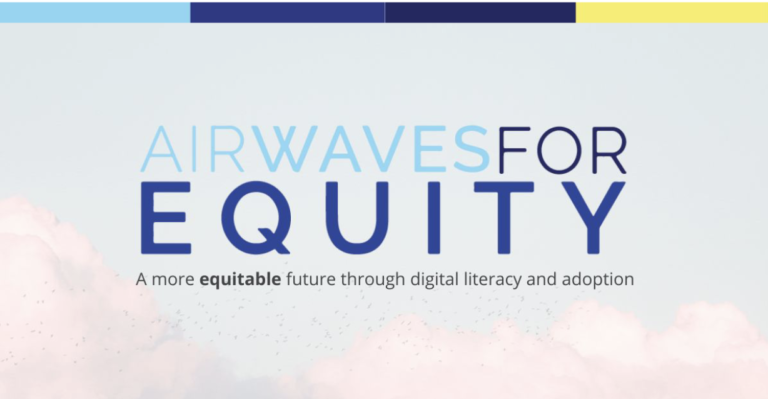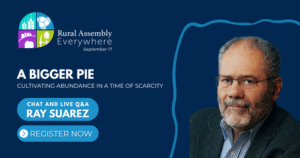Advocacy: Airwaves for Equity

The Center for Rural Strategies has joined Airwaves for Equity, an alliance of organizations committed to enhancing digital literacy and adoption in the United States by creating a Digital Equity Foundation funded by the proceeds from wireless spectrum auctions.
While billions of dollars are designated to broadband adoption and affordability, there is little funding devoted to digital equity and adoption projects in the United States.
For economic development, job growth, educational opportunities, disability access, telehealth, and so much more, we need training and equipped digital citizens.
During the Airwaves for Equity launch Feb. 23, Whitney Kimball Coe, director of national programs at the Center for Rural Strategies and director of The Rural Assembly, spoke about the need for digital literacy and adoption in rural communities — and how it directly relates to shoring up democracy.
An investment in digital literacy “would provide an ongoing source of support to rural families as technology shifts and changes and as more services move online,” Kimball Coe said.
Read all of her comments and learn how you can endorse the policy below.
Why digital inclusion matters to Rural America
Remarks from Whitney Kimball Coe:
I’m really glad to be here to address this third driver of the digital divide—digital literacy and adoption. Whenever we speak of digital inclusion, we must also speak of rural inclusion.
About 60 million of us call rural America home.
Rural America holds a vast and diverse set of communities, representing varied geographies, cultures and experiences. Rural families live in small towns, hollers, along our coasts, and on reservations. And many of them are grappling with the same challenges that occupy most families everywhere — figuring out how they’re going to cover expenses—how they’re going to achieve quality and affordable childcare, healthcare, education, housing—basic ingredients that must be in place in order for any family and any community to find a foothold in our democracy.
An additional basic ingredient that is also out of reach for many rural folks is broadband internet and the accompanying tools that are needed to ensure its adoption and use. And because broadband has been too expensive or unavailable in rural communities, residents have struggled to develop the skills to use it.
The Airwaves for Equity initiative directly targets that gap in literacy because it will help folks develop those skills alongside investments in infrastructure that will bring more affordability and accessibility to the countryside. It would provide an ongoing source of support to rural families as technology shifts and changes and as more services move online.
One more point I want to make—I want to name the link between digital inclusion and democracy:
Investment in digital adoption and literacy is an investment in shoring up our democracy because it strengthens communities in all the ways I just mentioned—allowing more families to take advantage of opportunities that exist through online technologies—think telehealth, online ed courses, legal services and a myriad of other services—not to mention increased opportunity to participate in building a nation that honors the dignity of all of us by ensuring greater participation in the global exchange of ideas, culture, and commerce.
Whitney Kimball Coe is the director of National Programs at the Center for Rural Strategies. In that role, she leads the Rural Assembly, a nationwide movement striving to build better policy and more opportunity for rural communities across the country. As an organizer, speaker, moderator, and writer, Whitney has shared her perspectives on community and civic courage with audiences around the world. She has been featured on stage at the Aspen Ideas Festival and the inaugural Obama Foundation Summit, and as a guest on the radio program On Being with Krista Tippett.
Get more rural advocacy news each week in your inbox.
Delivered to your inbox weekly, the Rural Assembly Advocacy newsletter focuses on rural advocacy efforts across the country. We’ll highlight rural leaders, issues, and action steps you can take to advance rural equity. We may throw in a song or book recommendation occasionally, too.







